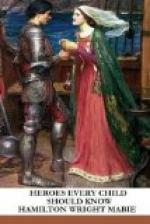Abraham Lincoln his hand and pen he will be good but god knows when.
God did know when; and that boy, all unconsciously, was working toward the day when his hand and pen were to do more for humanity than any other hand or pen of modern times.
Lamps and candle were almost unknown in his home, and Abraham, flat on his stomach, would often do his reading, writing, and ciphering in the firelight, as it flashed and flickered on the big hearth of his log-cabin home. An older cousin, John Hanks, who lived for a while with the Lincolns, says that when “Abe,” as he always called the great President, would come home, as a boy, from his work, he would go to the cupboard, take a piece of corn bread for his supper, sit down on a chair, stretch out his long legs until they were higher than his head—and read, and read, and read. “Abe and I,” said John Hanks, “worked barefoot; grubbed it, ploughed it, mowed and cradled it; ploughed corn, gathered corn, and shucked corn, and Abe read constantly whenever he could get a chance.”
One day Abraham found that a man for whom he sometimes worked owned a copy of Weems’s “Life of Washington.” This was a famous book in its day. Abraham borrowed it at once. When he was not reading it, he put it away on a shelf—a clapboard resting on wooden pins. There was a big crack between the logs, behind the shelf, and one rainy day the “Life of Washington” fell into the crack and was soaked almost into pulp. Old Mr. Crawford, from whom Abraham borrowed the book, was a cross, cranky, and sour old fellow, and when the boy told him of the accident he said Abraham must “work the book out.”
The boy agreed, and the old farmer kept him so strictly to his promise that he made him “pull fodder” for the cattle three days, as payment for the book! And that is the way that Abraham Lincoln bought his first book. For he dried the copy of Weems’s “Life of Washington” and put it in his “library.” But what boy or girl of today would like to buy books at such a price?
This was the boy-life of Abraham Lincoln. It was a life of poverty, privation, hard work, little play, and less money. The boy did not love work. But he worked. His father was rough and often harsh and hard to him, and what Abraham learned was by making the most of his spare time. He was inquisitive, active, and hardy, and, in his comfortless boyhood, he was learning lessons of self-denial, independence, pluck, shrewdness, kindness, and persistence.
In the spring of 1830, there was another “moving time” for the Lincolns. The corn and the cattle, the farm and its hogs were all sold at public “vandoo,” or auction, at low figures; and with all their household goods on a big “ironed” wagon drawn by four oxen, the three related families of Hanks, Hall and Lincoln, thirteen in all, pushed on through the mud and across rivers, high from the spring freshets, out of Indiana, into Illinois.




